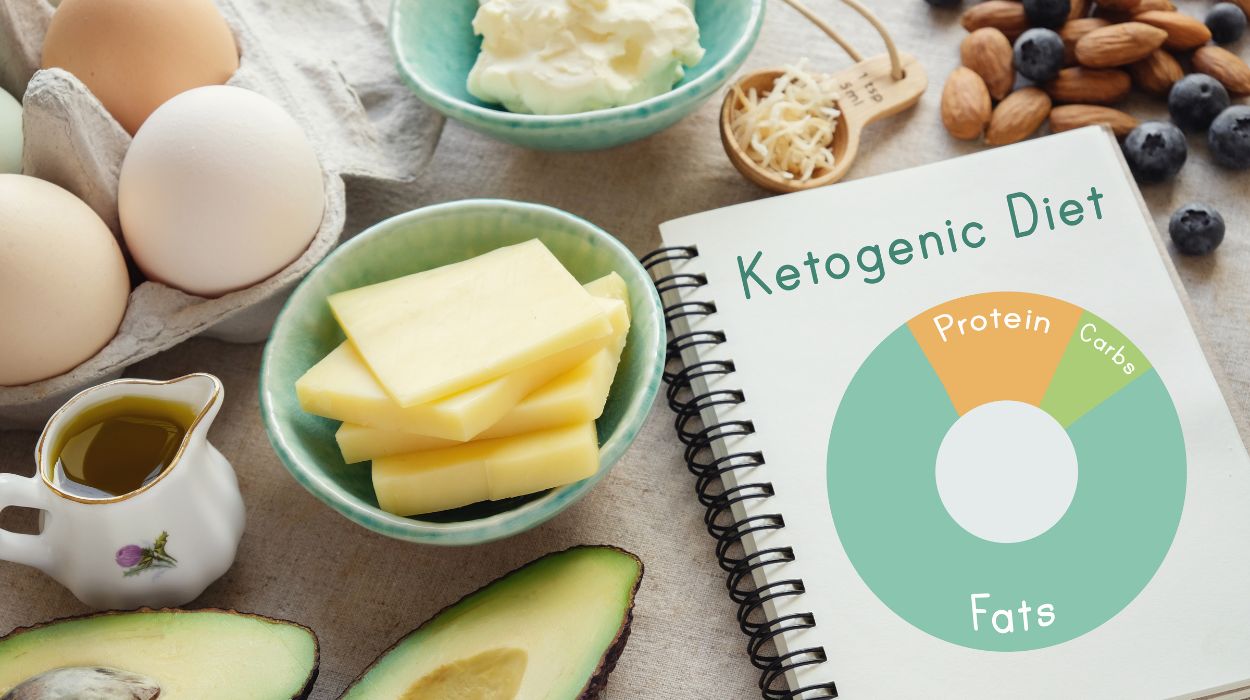 Evidence Based
Evidence Based
Evidence Based
This article is objectively based on relevant scientific literature, written by experienced medical writers, and fact-checked by a team of degreed medical experts.
Our team of registered dietitian nutritionists and licensed medical professionals seek to remain objective and unbiased while preserving the integrity of any scientific debate.
The articles contain evidence-based references from approved scientific sites. The numbers* in parentheses (*1,2,3) will take you to clickable links to our reputable sources.
Cyclical Ketogenic Diet 2024: Overview, Benefits & More

The cyclical keto diet is gaining popularity as a modified version of the traditional ketogenic diet. It combines periods of strict carbohydrate restriction with intervals of higher carbohydrate intake. This approach allows for occasional carb refeeding, which can have various benefits for certain individuals. Cyclical keto has been found to be a wonderful diet for women and men.
Cyclical keto provides a variety of foods that can be placed on your diet list! A keto app is a useful digital resource that provides individuals with comprehensive information, guidance, and support for successfully navigating and maintaining a ketogenic lifestyle. In this article, we will explore the concept of the cyclical keto diet and provide tips for following this dietary approach.
Cyclical Ketogenic Diet
The cyclical keto diet, also known as CKD, is a variation of the standard ketogenic diet. Numerous studies[1], including several randomized controlled trials (RCTs), have provided ample evidence showcasing the advantages of a low-carbohydrate diet in reducing the risk of various diseases. While the traditional keto diet emphasizes a consistent low-carbohydrate intake, the cyclical ketogenic diet incorporates intermittent periods of increased carb consumption. Typically, individuals following CKD adhere to a low-carb, high-fat diet for five to six days, followed by one to two days of consuming a higher amount of carbohydrates.
What Is A Cyclical Ketogenic Diet?

A cyclical ketogenic diet is a dietary approach that alternates between periods of strict carbohydrate restriction and intermittent periods of higher-carb intake. This variation of the standard keto diet allows individuals to experience the benefits of ketosis while still enjoying occasional carb-rich foods. The cyclical ketogenic diet typically involves following a low-carb, high-fat diet[2] for most of the week and then incorporating higher-carb days to replenish glycogen stores. The purpose of incorporating higher-carb days is to replenish glycogen stores in the body, which may have become depleted during the low-carb phase. By doing so, the keto cycle diet aims to strike a balance between the benefits of nutritional ketosis and the advantages of occasional carb intake.
What Are The Benefits Of Cyclical Ketogenic Diets?

Improved Athletic Performance
In the realm of sports nutrition, there is a growing trend toward reducing the role of carbohydrates, and the ketogenic diet has gained significant popularity, especially among endurance athletes. Athletes engaging in high-intensity or endurance activities may benefit from the cyclical keto diet. The strategic intake[3] of carbohydrates during the carb-loading phase can provide an additional source of energy, which may enhance performance during workouts or competitions.
Enhanced Muscle Glycogen Stores
The cyclical keto diet allows for periodic replenishment of glycogen stores, which are essential for optimal muscle function. This can be particularly beneficial for individuals who engage in strength training or other activities that rely heavily on anaerobic energy systems.
Improved Hormonal Balance
Some studies[4] suggest that the cyclical keto diet may have positive effects on hormonal balance, particularly in women. Hormones such as leptin, ghrelin, and thyroid hormones can be influenced by cyclical fluctuations in carbohydrate intake, potentially aiding body fat weight management and overall well-being.
Enhanced Adherence
For individuals who struggle with long-term adherence to a strict ketogenic diet, the cyclical approach can provide a level of flexibility. The periodic carbohydrate intake can help satisfy cravings, making it easier to stick to the dietary plan in the long run.
Tips For Following A Cyclical Keto Diet
Following a cyclical keto diet requires careful planning and consideration to optimize the benefits of this dietary approach. Here are some essential tips to help you navigate and succeed with your cyclical keto journey:
- Plan Your Carb-Up Days: When following the cyclical keto diet, it is essential to plan your higher-carb days in advance. This ensures that you consume the right types and quantities of carbohydrates to maximize the benefits of the cyclical approach while avoiding excessive intake.
- Choose Quality Carbohydrate Sources: During the carb-loading phase, focus on consuming nutrient-dense carbohydrates from whole foods. Opt for sources like sweet potatoes, quinoa, fruits, and vegetables to provide your body with essential vitamins, minerals, and fiber.
- Monitor Your Body’s Response: Pay attention to how your body responds to the cyclical keto diet. Some individuals may find that they need more or fewer carb-up days to optimize their performance and well-being. Experimentation and self-awareness are key to finding the right balance for your body.
By following these tips, you can effectively navigate the cyclical keto diet, enjoy a variety of foods, and reap the benefits of both nutritional ketosis and intermittent carbohydrate refeeding. Remember, finding the right balance and approach that works for you is key to long-term success on your cyclical keto journey.
Keto Diet Vs. Cyclical Keto Diet
While both the standard ketogenic diet and the cyclical keto diet share the goal of achieving and maintaining a state of ketosis, there are some key differences between the two approaches.
The standard keto diet requires consistent carbohydrate restriction, typically around 20-50 grams per day, to induce ketosis. It emphasizes a higher fat intake, moderate protein intake, and very low carb intake. This approach aims to keep the body in a constant state of ketosis. On the other hand, the keto cycle diet incorporates periods of higher carbohydrate intake, usually on designated carb-loading days. This allows for a temporary shift out of ketosis to refill muscle glycogen stores[5] and provide a break from the strict low-carb diet approach. The cyclical keto diet may be more suitable for individuals who engage in intense physical activity or struggle with long-term adherence to a strict ketogenic diet. When cycling carbohydrates, weight loss can be achieved without being detrimental to muscle growth.
Conclusion
The cyclical keto diet offers a flexible approach to achieving the benefits of ketosis while allowing occasional carbohydrate intake. By incorporating periods of higher carb consumption, individuals can replenish glycogen stores, enhance athletic performance, and maintain hormonal balance. It is important to plan carb-up days strategically and choose quality carbohydrate sources for optimal results. Remember to listen to your body and make adjustments as needed. If you’re considering the cyclical ketogenic diet, consult with a healthcare professional or a registered dietitian to ensure it aligns with your specific needs and goals.
+ 5 sources
Health Canal avoids using tertiary references. We have strict sourcing guidelines and rely on peer-reviewed studies, academic researches from medical associations and institutions. To ensure the accuracy of articles in Health Canal, you can read more about the editorial process here
- Ludwig, D.S. (2020). The Ketogenic Diet: Evidence for Optimism but High-Quality Research Needed. Journal of Nutrition, [online] 150(6), pp.1354–1359. doi:https://doi.org/10.1093/jn/nxz308.
- Zhu, H., Bi, D., Zhang, Y., Kong, C., Du Jiahao, Wu, X., Wei, Q. and Qin, H. (2022). Ketogenic diet for human diseases: the underlying mechanisms and potential for clinical implementations. [online] 7(1). doi:https://doi.org/10.1038/s41392-021-00831-w.
- Pavel Kysel, Denisa Haluzikova, Radka Doležalová, Laňková, I., Zdeňka Lacinová, Barbora Judita Kasperova, Jaroslava Trnovska, Viktorie Hrádková, Mraz, M., Vilikus Z and Haluzik, M. (2020). The Influence of Cyclical Ketogenic Reduction Diet vs. Nutritionally Balanced Reduction Diet on Body Composition, Strength, and Endurance Performance in Healthy Young Males: A Randomized Controlled Trial. [online] 12(9), pp.2832–2832. doi:https://doi.org/10.3390/nu12092832.
- Alessio Basolo, Magno, S., Santini, F. and Ceccarini, G. (2022). Ketogenic Diet and Weight Loss: Is There an Effect on Energy Expenditure? Nutrients, [online] 14(9), pp.1814–1814. doi:https://doi.org/10.3390/nu14091814.
- Burke, L.M. (2020). Ketogenic low‐CHO, high‐fat diet: the future of elite endurance sport? The Journal of Physiology, [online] 599(3), pp.819–843. doi:https://doi.org/10.1113/jp278928.



